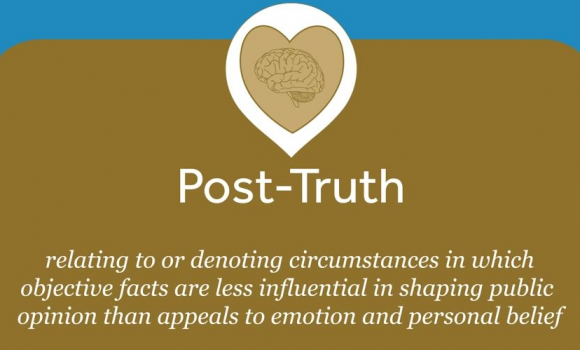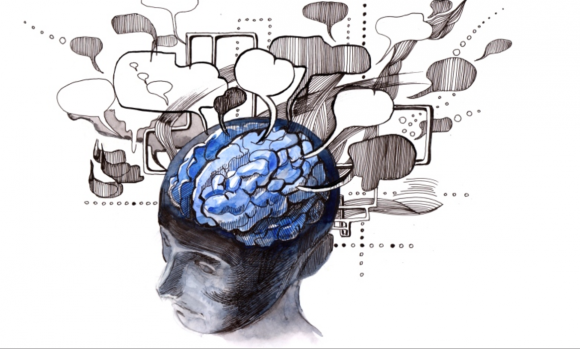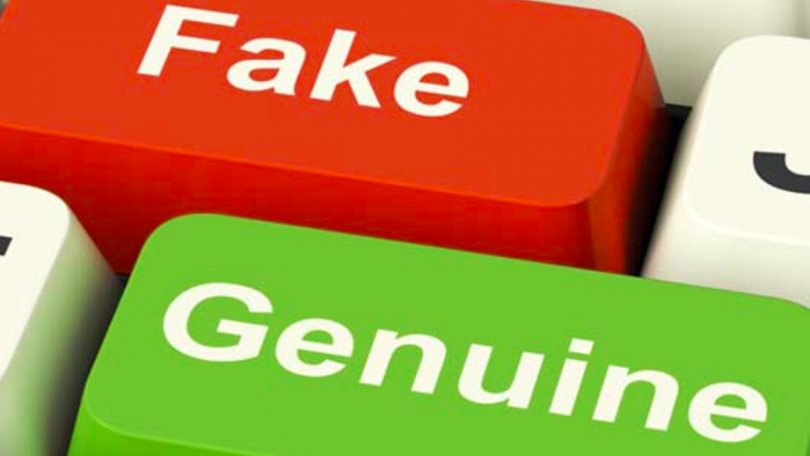This is part seven of our ongoing paramedia series, an investigation into fake news and the role it played in influencing the 2016 U.S. presidential elections. In this installment, existential psychologist Dr. Jason Dias explains why people believe fake news, and why no American is really immune. Find the whole series here. -Ed.
 aNewDomain — Post-truth.
aNewDomain — Post-truth.
It’s the Oxford English Dictionary’s 2016 word of the year for a reason.
In the last 600 days, give or take, media pundits and academics have been throwing that term around so often that it now that is already starting to get stale.
And not surprisingly, they’re all quick to characterize the 2016 US presidential election cycle as the very epitome of post-truth. Because the whole ordeal was immune to the facts, and also to all rational thought.
But it was only after we actually began keeping track of what was really going on during the campaign that everyone really started paying attention..
 So sure, I’ll agree we are living in post-truth times. You’d have to be blind not to see all the fake news, cheap innuendo and conspiracy theories that are on Facebook, Twitter and most every social network. It’s stupefying, how bad it’s gotten.
So sure, I’ll agree we are living in post-truth times. You’d have to be blind not to see all the fake news, cheap innuendo and conspiracy theories that are on Facebook, Twitter and most every social network. It’s stupefying, how bad it’s gotten.
But you’ll never convince me that any of us ever really cared about the truth.
Not here in America. Because none of us have cared about what’s true or real for as long as anyone can really remember.
The Tao of Lying
Why do people believe fake news? Why do millions of people share it, like it and comment on it, to the point that millions of American voters were too distracted or too misinformed to make an informed decision between two polar-opposite candidates with sharply divergent views on how America should be.
And I’m not just those people, either. All of us fall victim, whether we know it or not. And there’s a reason for that.
The littlest lies are the rationalizations.
When Politifact’s fact-checking report card on the candidates first came out, naming Hillary Clinton the most truth-y (but not totally truthful) of the candidates, Bernie Sanders fans rationalized it in the exact same way alt-right Trump supporters did: They told themselves it didn’t matter, that she was still beyond redemption, still a crook, still corrupt and still compromised by all kinds of people in powerful places.
Clinton supporters had a different challenge. They had to find a way to rationalize the fact that Clinton really is an extremely rich person with lots of Wall Street and big money connections: So they focused on that frumpy pants suit. And hey, didn’t her dad hang curtains for a living. And she’s a grandma, they kept saying. What grandma doesn’t love all the little people?
 As for Trump supporters, they faced the tallest order: They had to find a way to rationalize the fact that their candidate was this billionaire, a thrice-married casino owner and reality TV star who bragged about dodging taxes and the draft, someone who doesn’t act very Christian Conservative at all.
As for Trump supporters, they faced the tallest order: They had to find a way to rationalize the fact that their candidate was this billionaire, a thrice-married casino owner and reality TV star who bragged about dodging taxes and the draft, someone who doesn’t act very Christian Conservative at all.
But what to tell yourself about a man who lives in a golden $100 million Manhattan condo, who has himself photographed eating a bucket of Kentucky Fried Chicken, on his jet, with a fork?
The answer was quite brilliant: They all started calling him the Blue Collar Billionaire.
This label sufficiently satisfied Trump fans’ deep psychological need to make sense of the non-sensical, to reconcile the irreconcilable. We all have that need, and it’s aching.
Listen. This is messy stuff.
It’s a seduction
We’re all telling ourselves and everyone around us all sorts of lies and half-truths, just so we felt comfortable about making a pragmatic choice in a sea of imperfect options.
We rationalize and post-rationalize everything — out of habit — because it is one of the only ways we can quickly smooth out the inconsistencies of a world that grows ever more disorienting and confusing.
We’ve all been doing this our entire lives. We learned it from our ancestors.
There is nothing new about any of this.
This is why the fake news, conspiracy theories and hoaxes the paramedia rained upon us this election cycle worked so well.
And it begins to explain why so many people shared so many fake stories so often, and why so many of them even now won’t admit that the lies those fake stories promulgated were any worse than anything actual media outlets turn out.
It is not because we are stupid or because we can’t see the silliness in the latest fake news stream,
We are easily seduced by anyone who whispers even a hint of what we want to hear because we are used to it. All day long, every day of our lives, we tell ourselves and unending stream of lies, half truths and fairytales just to defend our fragile world views and feelings about our place in it all.
We love it doing it, too. It feels good. So we do it.
And we’re fragile
Ever notice the almost spooky similarities between Trump supporters and Biblical literalists?
 I don’t mean to challenge any person’s faith here, but talk about delusions. And that’s a core part of the problem: That most of us constantly have to be on guard to protect the ancient webs of delusion that underlie who we pretend to be.
I don’t mean to challenge any person’s faith here, but talk about delusions. And that’s a core part of the problem: That most of us constantly have to be on guard to protect the ancient webs of delusion that underlie who we pretend to be.
No wonder so many of us are depressed, angry or exhausted.
No wonder our political discourse is a minefield.
All faiths, even political faiths, seem insane from the outside.
To defend any faith at all, no matter how small, is, by its very definition, irrational. It is to countermand the evidence of the senses and, inevitably, of science.
We don’t want to admit it, so we hang on to the literal words of someone or something, a fantasy that can help us on that project.
Yet literalism is not our friend.
It leads us away from an objectivist examination of truth and any semblance of open-mindedness or empathy.
Post-truth politics — and the fake news epidemic that’s alarming media observers right now — is what happens when we’ve been lead away far enough.
On the extreme outer limits of all this is Ken Ham.
You remember Ham. He’s the creationist who makes headlines any time he engages in a fiery debate with a scientist.
Here’s one of my favorite Ham moments. It’s his much-hyped debate with Bill Nye the Science Guy.
Faced with over a century of scientific evidence casting doubt on creationist beliefs — and on undisputed scientific fact that the world is far, far older and more interlinked than anything the Christian Bible literally describes, he founds his own literature, his own scholarly-looking, but not scholarly, journals.
They do mirror scholarly journals in form, but not in substance.
 Ham only publishes works and research that favor his viewpoint. Then later, when he debates scientists, he doesn’t have to be embarrassed when they back up their cases with research that’s been published in academic journals. He just references his own journal, which is set up from the beginning to say and be anything it needs to.
Ham only publishes works and research that favor his viewpoint. Then later, when he debates scientists, he doesn’t have to be embarrassed when they back up their cases with research that’s been published in academic journals. He just references his own journal, which is set up from the beginning to say and be anything it needs to.
It’s an old strategy, too. We all have opposite and apparently equal arguments.
We all have old documents or moral convictions and even whole TV channels and corners of the Internet that are devoted to our viewpoints and those who share them.
Yes, it is possible to review the evidence in good faith and reach differing conclusions, but good faith is not the issue here.
 The issue here really is faith. And by that I mean faith, propaganda and trolling.
The issue here really is faith. And by that I mean faith, propaganda and trolling.
See, it isn’t just Ham. He’s playing an old game, but we all know exactly how to play it.
Oil companies cast doubt on climate science by trolling the journals and conferences with mirrored documents and talking heads. Anti-vaxers have piles of docs to fool the unwary, never mind that the finding that underlies their entire movement was debunked long ago. And the one and only guy who created the vaccine-autism myth in the first place has admitted he created the hoax.
Conservatives have always had Fox, at least it seems that way. And now they have Breitbart and literally hundreds of fake news and hoax sites that produce a ton of content that alt-right news sources can chew on, react to and pass on to unwitting Americans.
Liberals do fake news, too. They just suck at it
Liberals are in the game, too. There are liberal-leaning fake news sites, but they are late to the game and they only play half-heartedly. The big liberal media, like MSNBC, are too scrupulous and self-conscious about their fact-checking and their own reputations to troll the right very hard.
They can’t do it like Fox, and even Fox can’t do it like Breitbart.
And Breitbart can’t do it like Infowars, or EndtheFed or the GlobalNews, which now has taken to publishing violent debunking its own fake news.
There are a few liberal paramedia sites out there. But none of them have a Rush Limbaugh or a Sean Hannity or a Steve Bannon, much less a James O’Keefe.
What the left does have is comedians. There’s the Daily Show, now with the international face of Trevor Noah. And there’s @midnight, which is generally apolitical but now trolls Trump harder than most anyone else. And of course there’s Steven Colbert, who is now in the mainstream with an evening talk show.
And then there’s Bill Maher, who became this whole movement’s great founder after he was fired from ABC after 9/11. His crime: Saying that anyone capable of knowingly flying a jet into a building must be a little brave. And so a star was born.
To the delight of his many detractors, Maher ate humble pie on his show last week after confessing that he had been as nasty as Donald Trump. They played hard, he said, and he lost.
You won’t find a lot of Democratic leaders stooping to Trump’s level, but you will find Bill Maher doing endless Chris Christie fat jokes and finding new ways to paint conservatives as stupid, fact-resistant bubble-denizens week in and week out.
We Americans, see, have never cared much about facts. We care about dignity a little, and only when it suits us. But we care a lot about making sure that everyone stays in character within the confines of the roles they are assigned.
And we all know our roles.
 If you’re a liberal, you try to keep your hands clean. That’s why we all gasped when Hillary called half of Trump’s supporters “a basket of deplorables.”
If you’re a liberal, you try to keep your hands clean. That’s why we all gasped when Hillary called half of Trump’s supporters “a basket of deplorables.”
The right responded to her loss with finger-shaking admonitions that you can’t call half of America deplorable and win. Then they began calling themselves “proud deplorables” and began renaming their Twitter accounts with names like Deplorable Debbie and Deplorable Joe.
Not subtle, but that’s the role they play and we all know that, deep down inside, Hillary’s comment probably hurt a great deal.
Hillary’s sin was stepping out of character. We all agreed a long time ago that you can’t get verbally nasty if you’re a liberal. That’s for the comedians. And everyone else on the other side of the equation.
Trump, by the way, never fell out of character.
He was never nice. He never was generous. He never gave a real apology for anything. Who didn’t he offend?
I have this idea for a meme with a disappointed conservative on one side saying, “Trump, you can’t win by calling us names,” while on the other side Trump’s just repeating every single awful thing we heard him say over the last 600 days.
I just don’t know how to fit it all on a meme and I have no idea about how long it would take me to type it all out. You could spend the rest of your life crawling through just the references, you know.
 Even Pres. Barack Obama didn’t really get into office on the basis of a sane, rational discourse. He got there on the back of a failing economy — the Crush on Obama sexy YouTube videos and constant TV appeals from Oprah didn’t hurt, either.
Even Pres. Barack Obama didn’t really get into office on the basis of a sane, rational discourse. He got there on the back of a failing economy — the Crush on Obama sexy YouTube videos and constant TV appeals from Oprah didn’t hurt, either.
But the main thing Obama taught us, we could’ve learned on the very first day of political science class if we had only enrolled: that elections aren’t best predicted by polling.
They’re predicted by how folks feel about the economy.
As the economy went into free fall back in 2007, the electorate threw out the incumbent party.
The so-called Hope and Change phenomenon was never really about “that hopey-changey” thing, as Sarah Palin dubbed it in an interview with NPR back in 2010.
And it was no more a rational choice than the one that just put Trump and his alt-right into power.
It never, never is.
I’ve been thinking a lot lately about a president we never talk about, Pres. Jimmy Carter.
People used to trash him for being a downer.
He told America some stuff we needed to hear: that we had to take responsibility and settle for less.
We wouldn’t hear it. We couldn’t handle the truth, as Jack Nicholson’s character said in “A Few Good Men.”
As a result, the future Nobel Peace Prize winner slash Plains, Georgia peanut farmer got road rash on his backside after we tossed him across the parking lot and back to where he came from — just four years after he arrived.
We want to make these things about reason. The numbers on college-educated voters seemed to bear out that the fact that so many of us non-Trump supporters wanted to believe all along.
Namely, that people with the ability to engage formal logic would vote blue.
This is pretty much bullshit.
All that has happened is that the economy has shifted away from jobs that don’t require these skills.
So it is a rational matter for educated liberals to vote liberal.
But it’s another matter entirely for the those out here in the middle of the country, who don’t see the rosy economy that everyone on the coasts claim to enjoy.
To expect folks in two rust belt states to stay blue under these conditions was the height of fantasy.
They jumped ship. And we all love our fantasies.
Unfortunately, I fear these people will be the real losers in the end.
 Gotta love them Bible giants …
Gotta love them Bible giants …
We are all just victims of the lies we tell about ourselves and other people, too.
Think about The Learning Channel. It’s dry, unreality programming.
Meanwhile, the last decade of The History Channel has been full of Nazi conspiracy theories, tales of Bible giants and Doomsday preppers, whose role in our drama seems mainly to play themselves on TV.
Also you’ll find plenty of fake archaeology and a galaxy-sized stream of ancient alien history. They actually call it that!
This isn’t Breitbart, you know. And never do see old History obviously labeling its junk food content as fake news.
Better still, you can share it all you want on Facebook, just as millions of Americans have been sharing stories about Hillary selling 20 percent of the nation’s uranium to Russia, Russian president Vladimir Putin putting billionaire octogenarian Geroge Soros on his Wanted Dead or Alive list, not to mentions stories of Clinton campaign chair John Podesta eating his own blood, or semen, or whatever body fluid is starring in the latest round of fake news reports around his “spirit-cooking” and witchcraft practices.
America is so well prepped for the fake news deluge.
And here we are, sitting idly by and (usually) not even lifting an eyebrow as a mainstream channel once dedicated to a a just-the-facts field like “history” chooses to instead entertain us and dumb it all down, all the while feeding right into our secret desire to believe that yes, the imaginary might be real after all.
 And before you hold up a show like Monster Quest as an example of “real” scientific content History offers, notice that it polishes off every generally solid scientific production with a weird open instructing us to imagine, to leave open all possibilities.
And before you hold up a show like Monster Quest as an example of “real” scientific content History offers, notice that it polishes off every generally solid scientific production with a weird open instructing us to imagine, to leave open all possibilities.
This is the show that once spent an entire hour providing all the evidence it had that Bigfoot has always just been a big, furry black bear, complete with footprint, DNA and forensic hair analysis. But at the end, they conclude with a message that says something like: Maybe we’re wrong and there really are monsters.
These are the lies we need to hear.
We Americans also need to know that no one thinks we’re stupid, not even Donald Trump when he tried to convince us all that the Chinese invented global warming.
We want them to think better of us.
Because the bottom line is, we believe untrue things because we want to, not because we aren’t smart enough to notice or figure it out.
Smart people like us can rationalize anything. We’re good at it, it’s how we go on, for better or (mostly) worse.
We do this for all kinds of reasons. For political gain. Because we’re too broke — or because we can’t quite forgive ourselves for being too rich. We do it to fit in. To feel better. To feel different. To relax. To feel like a kid at his first football game or like a little girl who is waiting for Santa.
We do it because we’re scared of dying, or just scared, and sometimes, because we can’t admit there is egg all over our faces and spinach in our teeth. If admission is powerlessness, as Bill Wilson’s 12 steps say, then refusing to admit can feel like real, genuine power.
Nothing about this is news.
Isaac Asimov mentioned it decades ago. So did Carl Sagan.
We are spoon fed pabulum through every conceivable source. Even our science textbooks sometimes come with disclaimers that science doesn’t disprove creationism.
No wonder so many millions among us seem helpless before the dozens of fake news stories that come out daily, no wonder we share them, no wonder we protest to those who make fun of those stories that, whatever man, your media sources are propaganda, too.
Yet I remain hopeful.
Against all the evidence, I’m thick-headed enough to believe in us all. We are getting better and better at teaching young people how to reason, how to tell good from bad sources. That means the half-life of bullshit will just keep getting shorter.
We’re still reacting to the consequences of that, of sources like Twitter being more of a ten minute news cycle than a 24 hour one, but we’ll adjust. We’ll refine and improve.
Or that could be just another lie I tell myself …
For aNewDomain, I’m Jason Dias.
Cover image: ThatsNonsense.com, All Rights Reserved.
Inside images: Donald Trump eating KFC with a fork, on his jet: DailyMail.co.uk, All Rights Reserved;
Inside the mind: iThinkBigger.com, All Rights Reserved; Deplorables: USAToday.com, All Rights Reserved; Jimmy Carter: Graphiq.com, All Rights Reserved.













